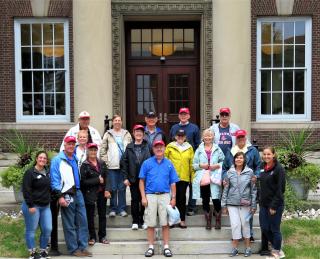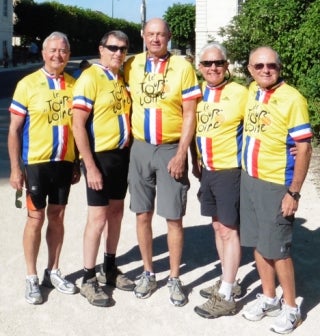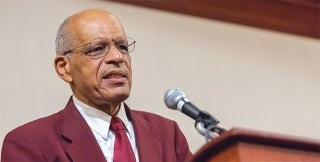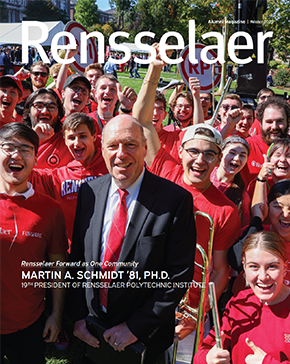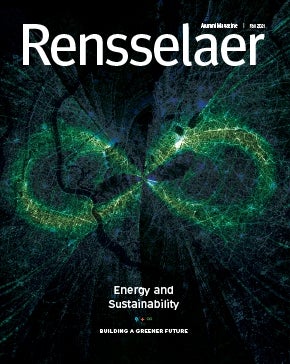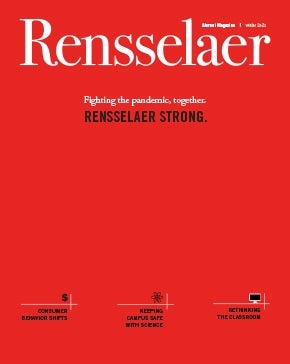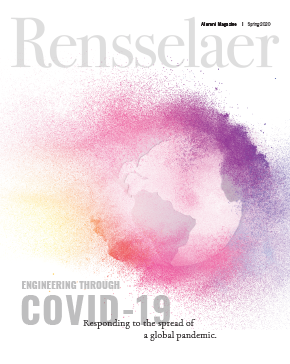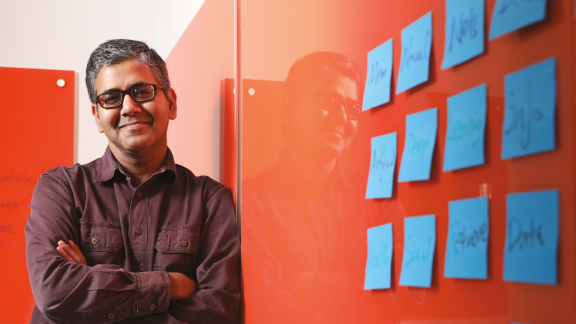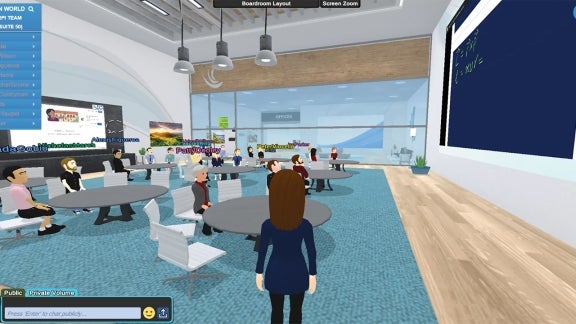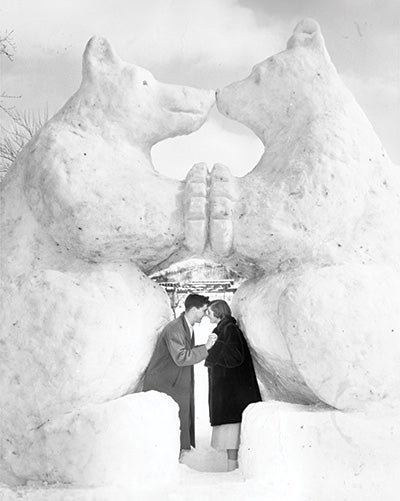1967
Engineering
Ken Canham earned a bachelor’s in industrial engineering in 1967 and a master’s in management in 1968. “It’s only taken me 14 years to sit down and write to Rensselaer magazine,” he says. “That’s when I left the corporate world and started thinking I ought to write a bit about my life and career. I had a second career run as a consultant that delayed the effort; then, I got busy with volunteering, travel, family matters, investing, taking care of my sister, building a retirement house, etc. So here it is, 2020, and I’m sitting at my home computer; we can’t go many places because of the virus and all of a sudden, I think of putting down on paper something for the magazine.
“First, hello to my friends that I met at RPI and my brothers at Phi Kappa Theta,” he says. “I never worked so hard or played so hard than I did during five years at the ‘Tute.’ The ‘playing,’ of course, was mainly due to the fraternity. I was able to scratch financially through a fifth year by doing odd jobs around the campus, including bartending for Father Phelan. My career was all in information technology for five corporations over 40 years, ending with a few years in consulting. That timeframe encompassed huge changes in the profession and the technology, which kept me focused and engaged. The last two assignments were as chief information officer for multinational firms. I was fortunate to have visited 50 countries on business travel and helped create IT organizations and manage them as the companies expanded.”
“While at RPI, I met my future wife, Lillian, who was at Albany Med in the nursing program,” he says. “We’ve been in Pennsylvania since 1992, having moved for work and remain there in retirement; but we get to Massachusetts and Florida a lot as we have friends, family, and homes there. After retiring, I had strong feelings about ‘giving back,’ having had a great career. This prompted efforts with other IT retirees to start a foundation that we called PHISIM. The purpose is to support other nonprofits that sponsor activities in IT to help disadvantaged youth. We’ve distributed over $300,000 in scholarships, IT camps, and teacher aid in the Philadelphia area. Being at RPI was a fantastic jump start to adult life and I cherish the memories.”
Posted 2021-09-29
For the second year in a row, Lee Savidge won three first-place creative writing awards at the local level (Upstate New York) in the Veterans Administration Annual Creative Arts Competition. Last year, Lee’s poem, “Fly Me To The Moon,” a tribute to Neil Armstrong, won third place at the national level.
Posted 2021-02-26
Engineering
Here is a great life story from Paul Sa. “It has been 50 years since RPI and yet the memories of those cold bleak mornings are still sharp. The snow started in November and we didn’t see the ground again until late March, maybe early April. I remember those cold walks from AXP on Tibbits Ave. and walking with frozen feet down through the Quad to Sage and those endless, early morning chem labs.
“Somehow I managed to finish in four years, and got into Harvard Business School. Brand-new MBA in hand, I took the highest paying job offer I got, which took me to American Standard in NYC. It was incredible! I was earning a living at last, I had a car, I had an apartment to myself, and all those girls! Of course, you know that was too good to last. Next thing you know, I was banished to a smelly plant in Piscataway, N.J., where I was to spend the next three years learning how to make fiberglass bathtubs, and to not breathe too deeply of the polyethylene fumes and fiberglass particles in the air. There was a management shakeup and at the age of 27, I quit and left my last job in corporate America. What followed was five years of unmitigated horror. I got involved with guys in a marina in Atlantic City, which rolled into a Kawasaki motorcycle dealership, and ended with me and my partners owning a bar-nightclub. In retrospect, I can’t imagine how I could have been so stupid, so naïve, so helpless in dealing with unscrupulous partners in a cash business. Thank God, my parents immigrated to the U.S., and my father brought me into his fold to work in ocean shipping.
"I got my real start in 1977, starting my own shipping company. I also had the good fortune to be helped by an RPI classmate, Don Robohm, who was CFO for Seaboard Allied Milling in the late ’70s. Seaboard had a flour mill in Sapele, Nigeria, and had difficulty finding suitable ships to carry American wheat there from the U.S. Gulf. On my advice, they built seven specialized shallow draft bulk carriers in Japan and I got the contract to manage them. I stayed in shipping for 35 years but finally closed my company in 2011. I have found great peace in retirement. I used to competitively ride horses over jumps, but three years ago, my son said I was too old for such a dangerous sport (I had broken many bones in falls). Instead he found me a new safe hobby. I have now logged 200+ hours as a pilot flying low-wing Piper Cherokees.”
Posted 2020-05-14
Stu Berg Since I received no information for this issue, I decided to “prime the pump” with a tidbit about me: For the past 35 years my wife and I have been involved in a Cornell University program (we live in Ithaca, N.Y.) currently called the Cornell International Friendship Program (CIFP). Each year, many Cornell international students and scholars arrive in the U.S. for the first time. For those that request it, the CIFP matches them with local community participants for the purpose of cultural exchange. It’s like any other exchange program, except that the students and scholars live at Cornell and socially meet with their local community participants periodically. It is common for the participants to form close bonds for life. All involved individuals are volunteers, including the program manager. This program is run by the Office of Global Learning at Cornell. We’ve made many wonderful international friends over the years from all over the world and even visited some of them. One of those friends even asked me to be best man at his Ithaca wedding and I accepted. I like to think of it as promoting world peace one friendship at a time.
Posted 2019-10-01
IVCF 50th Reunion: In September, eight alumni associated with the InterVarsity Christian Fellowship at Rensselaer gathered to celebrate the 50th anniversary of the time they lived together at the IV House on Hill Street. Among many activities, they enjoyed a campus tour organized by the Rensselaer Alumni Association, and attended the traditional Friday night IVCF meeting at the Student Union. Alumni who attended, from left, interspersed with their wives and student guides, were Dick Pedersen ’70, Jeff Ferguson ’70, Russ Cherry ’70, Dave Green ’67, Al Ryder ’69, Paul Diamantopoulos ’69, and Jim Stori ’69. Duane Campbell ’71 also joined them for the IVCF meeting. “We had a wonderful five days,” said Dave Green ’67. “We try to get together every two to three years; this was our 10th reunion.”
Posted 2019-03-10
Science
The American Cancer Society (ACS) recognized Dr. John Ruckdeschel, director of the University of Mississippi Medical Center Cancer Institute since 2017, with the St. George Award for his lifetime body of work to eradicate cancer and his continuing support of the ACS. He is a professor of medicine in the Division of Hematology and Oncology at the University of Mississippi. The St. George Award is the most prestigious award that the American Cancer Society bestows on volunteers.
John began RPI studying aeronautical engineering but changed his major to biology in his sophomore year. He graduated from RPI with a bachelor’s degree in biology in 1967 and completed a medical degree from Albany Medical College in 1971. Then he began his internal medicine internship at Johns Hopkins Hospital before moving on to an oncology fellowship at the National Cancer Institute from 1972 to 1975. He completed his senior residency in internal medicine at Beth Israel Hospital in 1976.
Posted 2019-03-10
From Steven Kramer (B.S. ’67, M.S. ’68, Ph.D. ’73): “After I earned my doctorate at RPI, I started my teaching career at The University of Toledo (Toledo, Ohio). I retired from there in 2008 after a 35-year career in teaching and research. During that time I served as director of undergraduate studies in both mechanical and industrial engineering from 1994 to 2008. My research areas included mechanical design, kinematics, dynamics, human factors, ergonomics, and computer-aided design. I published over 90 articles in various conference proceedings and archival journals.
“Interspersed with my studies at RPI, I was an associate mechanical engineer at IBM Corp., a test engineer at Outboard Marine Corp. driving boats on Lake Michigan for a whole summer, which was a blast, a draftsman at the Dunham Tool Co. in New Fairfield, Conn., and associate research engineer at Albany International Corp.
“While at the University of Toledo, I assisted attorneys in over 250 cases for both plaintiff and defense in motor vehicle accident reconstruction as well as accidents in the home and workplace. I was an expert witness in many product liability and accident cases.
“I have been active in ASME over the years. This included University of Toledo ASME faculty advisor for 18 years, national chairman of the Design Engineering Division Honors and Awards Committee, chairman of the Education Group, and many other positions. In 1987 I became an ASME fellow.
“I was fortunate to have received several awards during my career. This includes the University of Toledo Outstanding Teacher Award in 1984 and the Outstanding Advisor Award in 1994. In 1985 I received the Ralph R. Teetor SAE Award. I received the ASME Faculty Advisor Award for Region Five three times. In 1988 I was chosen as the Outstanding Engineering Educator for the State of Ohio by the Ohio Society of Professional Engineers. In 2000, I received the Honors Professor of the Year at the University of Toledo.
“Since retiring in 2008 I have been a volunteer math and science tutor, first at a local community center, and now at Perrysburg High School and Junior High School (Perrysburg is just south of Toledo). I also became a snowbird. My wife and I go to Fort Myers Beach for two months in the winter. On the way down and back, we visit our son, daughter, and five grandchildren who live near Orlando.”
Posted 2018-10-10
Humanities, Arts, and Social Sciences
From Norm Leferman: “You might wonder what a person with an undergraduate degree in language and literature from RPI might become. In fact, unless you knew one of the three to five people in the program in the mid-’60s, odds are that you didn’t even know that the ’Tute offered such a degree. Well, they did and I was one of the very first to earn it. Now, 50 years later I am happy to report that I have had a very successful, 45-plus-year career in market research, specializing in communications testing and new product development and positioning. After a brief stint as a computer programmer to earn some money while attending graduate school, I was hired by BBDO Advertising as a market research analyst with no relevant experience. But they taught me a lot. By 1977, I had enough experience and intestinal fortitude to found Leferman Associates. Since then I have had the good fortune to work with over 360 client companies (all the big names in foods, cosmetics, financial services, and medicine), conducting all manner of quantitative and qualitative studies. And, I am still working—every project is a new adventure. While I can’t say that my degree in language and literature provided any specific assistance, I will say that having any degree from RPI (along with my UConn MBA) gave me some early credibility as I launched my career.”
Posted 2018-10-10
From Lee Savidge: “I am an active member of the Syracuse Veterans Writing Group, Syracuse, N.Y., and we recently published an anthology titled The Weight Of My Armor. Included are true stories and some poems from 23 veteran men and women whose service in the U.S. military varies from WWII to the most recent conflicts in Afghanistan and Iraq. All military services and the Coast Guard are represented. The publisher is Parlor Press in conjunction with New City Press and you can check it out at Amazon. My story in the anthology is titled ‘Air Force Brats Conquer Alaska.’ ”
Posted 2018-10-10
Five Lambda Chi Alpha brothers, family, and friends enjoyed a bicycling vacation in Paris, France, and the Loire Valley this spring. From left, are Dave Burkhart ’69, Bob Darnall ’67, Chan Sweetser ’67, Lee Broad ’68, and Pete Donohoe ’69.
Posted 2018-10-10
Engineering
Reginald Amory, Ph.D, returned to campus in October to celebrate the 50th anniversary of his graduation. Amory was recognized, both at the RAA Awards Dinner and at the 50 Year Club luncheon, as the first African-American to earn a doctorate in civil engineering, or in any field, at Rensselaer. In over two decades as chair of the Department of Civil Engineering at Morgan State University, he has educated more African-American bachelor of science graduates and doctoral holders in civil engineering than any other such program in the U.S.
Posted 2018-03-15
Science
Timothy Holls sent in this streamlined summary of everything from his education and career to some of his most vivid memories of Rensselaer and his interests:
"Education, RPI, B.S. mathematics (computer science emphasis), 1967; Syracuse University, M.S. computer science, 1977."
"Employment: Computer programmer, software development/test; employed at IBM Poughkeepsie, 1967 until 1994 downsizing; USAF 1969-73 computer work, Lackland AFB in sunny San Antonio, Texas; contract computer work 1994-2001."
"Memories of RPI: Dorms: Crockett, Quadrangle Pardee-I, Church-I, E-Dorm: Clement-I. Snowstorm Jan. 13, 1964, closed RPI campus/classes. Unusual cars: Chrysler Turbine, 1964½ Mustang, 1965 Shelby Cobra. RPI won football game Oct. 23, 1965, first time in six years. Great Northeast Blackout Nov. 9, 1965. Glee Club bus tour Jan. 1966: Buffalo, Detroit, Cleveland, Pittsburgh. RPI completed WINNING football season as of Nov. 12, 1966. Worked in Amos Eaton computer lab with IBM 360 Mod-50, 1967."
"Highlights: Published family genealogy, 1971: Holls Family. APL Programming Guides published by IBM, 1977, 1978. Presented paper at APL ’84 Conference, Helsinki, Finland. Personal computers IBM-PC, Laptops; 640K->12GB. 2004+ Riverhead High School RHSYB digitized yearbooks. 2012 RPI Class of ’67 documents digitized RPIYB."
"Interests: History (local, NYS, etc.). Activities: PC projects; digitized—local history data. Memoirs; 1,000 familiar melodies."
Posted 2018-03-15
Engineering
Jeffrey Stanton offered this detailed rundown of his life after graduating: "Received a master’s in mechanical engineering from RPI (1969). While they tried to draft me to go to Vietnam during my final semester at RPI, I made a deal with my draft board to go out to California and design weapons in the aerospace industry. I was a rocket scientist at TRW, worked on laser weapons and space satellites for Hughes, but I got laid off numerous times for long periods and no commercial engineering company would hire an aerospace engineer. I quit after 1975. I had planned to either design amusement park rides or industrial robots. Those career plans would never be fulfilled."
“While I lived in Venice, Calif., I worked as a freelance photographer for several years, and started a postcard company in 1979 to promote my career. I also created the first cartoon map of a town in the United States, but mostly had trouble selling the concept. When I did the second map of Venice, Calif., it was banned by the chamber of commerce because of its realistic cartoons."
“I bought an Apple II computer in 1979, then teamed up with the sixth largest software company to start their book division. My software review books earned millions, but I did the initial project for cash, not royalties. As a game programmer, I wrote the textbooks for designing computer arcade games for the Apple and Atari computers using assembly language. I was a successful game consultant until 1986 when I was in my early 40s. Unfortunately, I was a generation too old, old enough to be most programmers’ father. My career ended, as no one would hire anyone in their 40s."
“I managed an apartment building and sold postcards on weekends along Venice’s famed boardwalk to earn income. I was also a big collector of historic Venice photos because of its famed amusement piers and canal network of waterways instead of streets. I self-published a coffee-table history book about the resort and eventually enlarged the book in 2005 until it had 367 photos and 100,000 words of text. Because stores weren’t interested in selling it and Amazon doesn’t allow self-published books, I resorted to selling it by riding around Venice on a bicycle and showing it to anyone I encountered."
“While I created many internet history websites in 1996-1997 and was taken to lunch, my startup internet companies needed to pick my brain. No one would hire me because I was 25 years too old. Technology finally disrupted my postcard business and people don’t want to buy books in the Los Angeles area. They use a cell phone to email pictures. Also, the police don’t allow me to sell my books and photo postcards any longer because they have a dual use. My cards can be mailed and my books read."
“I also wrote a history book about Coney Island, N.Y. Publishers want the 500-page text condensed to less than 5,000 words because they just want to do a quick picture book, claiming no one reads history. Since I have all the ride patents, I described how each attraction works. Besides, I have a reputation of doing outstanding books that don’t sell. So I’m basically retired now, and to keep busy I go to Disneyland every two weeks to ride all the rides.”
Posted 2018-03-15
Michael Goldfinger had this to say about what he's been up to since leaving Rensselaer: “I recently retired after a 43-year career that started after leaving RPI. As an officer in the U.S. Navy Civil Engineer Corps, I served as resident officer in charge of construction at the Naval Ordnance Laboratory, White Oak, Md., where I oversaw the construction of several large unique research facilities, including one to test the aerodynamics of Navy aircraft flying at several times the speed of sound. With the wind-down of the Vietnam War, I took advantage of an early out and left active duty to pursue a career in architecture."
“I remained in Washington, D.C., working for several architectural firms and passing the architectural registration exam. I hold licenses in Maryland and Virginia. I accepted a position in the U.S. Department of Justice, serving as the head of the agency’s space planning branch. During the 12 years at Justice, I earned an MBA from the University of Maryland, and promptly left government service."
“During the next few years, I joined a communication company as construction manager responsible for the terminals and repeater stations supporting the firm’s fiber-optic network serving the Northeast U.S."
“I subsequently accepted an offer to join the management consulting firm Booz Allen Hamilton (Booz Allen), where I led a number of high-profile client engagements, supporting the management of government facilities for federal agencies including the Environmental Protection Agency, Department of Agriculture, Department of the Army, Bureau of Printing and Engraving (U.S. Treasury), and the Department of Homeland Security. One noteworthy project resulted in the development of the 10-year facilities master plan for the National Marine Sanctuary Program (NMSP), an operational agency of NOAA. Formed in the 1970s to protect natural, cultural, biological, and environmental resources in territorial waters off the nation’s East, West, and Gulf coasts and Great Lakes, the agency lacked a coherent plan for housing its enforcement, education, and outreach functions. The resultant plan documented current space, determined near- and long-term requirements, and provided estimates of the costs to achieve those goals. As a result of this work, NMSP retained its facilities funding when those funds were rescinded from most other federal agencies."
“Finally, at the end of the day, it was time to devote myself to other activities, including time at the gym, visits with children and grandchildren, yard work, and travel.”
Posted 2018-03-15
Reginald Amory, Ph.D ’67, returned to campus in October to celebrate the 50th anniversary of his graduation. He was recognized, both at the RAA Awards Dinner and at the 50 Year Club luncheon, as the first African-American to earn a doctorate in civil engineering, or in any field, at Rensselaer. In over two decades as chair of the Department of Civil Engineering at Morgan State University, he has educated more African-American bachelor of science graduates and doctoral holders in civil engineering than any other such program in the U.S.
photo credit: Kris Qua
Posted 2018-03-15

